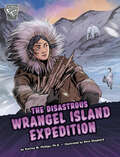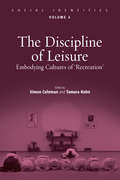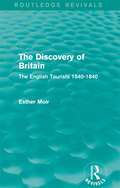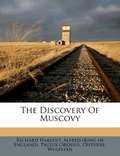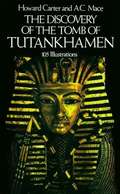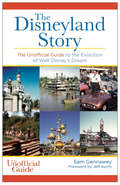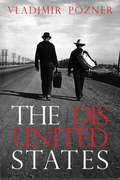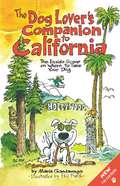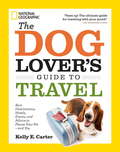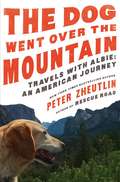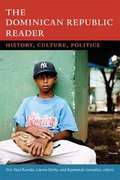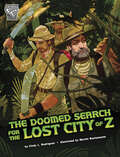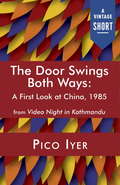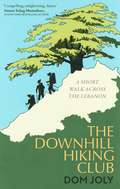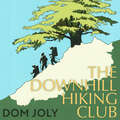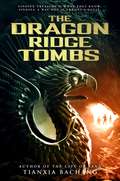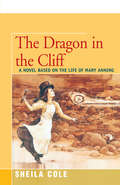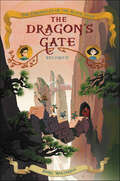- Table View
- List View
The Disastrous Wrangel Island Expedition (Deadly Expeditions)
by Katrina M. PhillipsIn 1921, Inupait seamstress Ada Blackjack joined a a group of four white men who wanted to establish a trading post on Wrangel Island in the freezing Arctic Ocean. The explorers were stranded on the island when their return ship was forced to turn back due to ice. Facing harsh conditions and dwindling food supplies, the men died one by one, but Ada remained. Find out how she alone managed to survive the disastrous expedition.
The Discipline Of Leisure: Embodying Cultures of 'Recreation' (Social Identities #4)
by Simon Coleman Tamara KohnThe burgeoning social scientific study of tourism has emphasized the effects of the post-industrial economy on travel and place. However, this volume takes some of these issues into a different area of leisure: the spare-time carved out by people as part of their everyday lives - time that is much more intimately juxtaposed with the pressures and influences of work life, and which often involves specific bodily practices associated with hobbies and sports. An important focus of the book is the body as a site of identity formation, experience, and disciplined recreation of the self. Contributors examine the ways rituals, sports, and forms of bodily transformation mediate between contemporary ideologies of freedom, choice and self-control.
The Discovery of Britain: The English Tourists 1540-1840 (Routledge Revivals)
by Esther MoirFirst published in 1964, this book examines the Tour of Britain. It focuses, neither on foreign tourists coming to Britain, nor on British tourists travelling abroad, but on British people exploring their native land in the three centuries from 1540 to 1840. During this period, it became a popular pastime amongst gentlemen of leisure to travel for weeks, even months, in discovery of their own country and this book describes both the pleasure taken by tourists of Britain and the hardships they endured. Tracking these journeys over three centuries, the book presents a changing English landscape, a changing economy, and a change in people’s tastes as the interests and concerns of the tourists evolve over the timeframe covered.
The Discovery of Muscovy
by Richard HakluytIt remaineth that a large discourse be made of Moscow, the principal city of that country, and of the prince also, as before we have promised. The empire and government of the king is very large, and his wealth at this time exceeding great. And because the city of Moscow is the chiefest of all the rest, it seemeth of itself to challenge the first place in this discourse. Our men say, that in bigness it is as great as the city of London, with the suburbs thereof.
The Discovery of the Tomb of Tutankhamen
by Howard Carter A. C. MaceNovember 4, 1922. For six seasons the legendary Valley of the Kings has yielded no secrets to Howard Carter and his archeological team: "We had almost made up our minds that we were beaten," he writes, "and were preparing to leave The Valley and try our luck elsewhere; and then--hardly had we set hoe to ground in our last despairing effort than we made a discovery that far exceeded our wildest dreams."Join Howard Carter in his fascinating odyssey toward the most dramatic archeological find of the century--the tomb of Tutankhamen. Written by Carter in 1923, only a year after the discovery, this book captures the overwhelming exhilaration of the find, the painstaking, step-by-step process of excavation, and the wonder of opening a treasure-filled inner chamber whose regal inhabitant had been dead for 3,000 years.104 on-the-spot photographs chronicle the phases of the discovery and the scrupulous cataloging of the treasures. The opening chapters discuss the life of Tutankhamen and earlier archeological work in the Valley of the Kings. An appendix contains fully captioned photographs of the objects obtained from the tomb. A new preface by Jon Manchip White adds information on Carter's career, recent opinions on Tutankhamen's reign, and the importance of Carter's discovery to Egyptologists.Millions have seen the stunning artifacts which came from the tomb--they are among the glories of the Cairo Museum, and have made triumphal tours to museums the world over. They are a testament to the enigmatic young king, and to the unwavering tenacity of the man who brought them to light as described in this remarkable narrative.
The Disneyland Story
by Jeff Kurtti Sam GennaweyThe Disneyland Story: The Unofficial Guide to the Evolution of Walt Disney's Dream is the story of how Walt Disney's greatest creation was conceived, nurtured, and how it grew into a source of joy and inspiration for generations of visitors. Despite his successors' battles with the whims of history and their own doubts and egos, Walt's vision maintained momentum, thrived, and taught future generations how to do it Walt Disney's way.
The Disunited States
by Vladimir Pozner Alison StrayerInfluential French novelist, screenwriter, pioneer in literary genre and Oscar nominee Vladimir Pozner came to the United States in the 1930s. He found the nation and its people in a state of profound material and spiritual crisis, and took it upon himself to chronicle the life of the worker, the striker, the politician, the starlet, the gangster, the everyman; to document the bitter, violent racism tearing our society asunder, the overwhelming despair permeating everyday life, and the unyielding human struggle against all that. Pozner writes about America and Americans with the searing criticism and deep compassion of an outsider who loves the country and its people far too much to render anything less than a brutally honest portrayal. Recalling Agee's Let Us Now Praise Famous Men, Pozner shatters the rules of reportage to create a complete enduring and profound portrait. From the Trade Paperback edition.ep compassion of an outsider who loved the country and its people far too much to render anything less than a brutally honest portrayal. Recalling Agee's Let Us Now Praise Famous Men, he shatters the rules of reportage to create a complete portrait of America, enduring and profound.From the Trade Paperback edition.
The Diver and The Lover: A novel of love and the unbreakable bond between sisters
by Jeremy Vine'The lives of the characters get entangled in this powerful read' WOMAN'S OWN'A pacy, gripping tale of secrets, love and betrayal in 1950s Catalonia, written with skill and colour. It gave me enormous pleasure to read such a satisfying novel.' SANTA MONTEFIORE 'If you're in desperate need of a far-Flung getaway, indulge in this slice of escapist fiction' HEAT'Being transported to a Spanish summer in 1951... I feel the cool of the shadows under the trees and hear the sea as it glistens in the rippling heat. I think you might like it too!' FERN BRITTON'As colourful, rich and mesmerising as one of Dali's paintings, this absorbing, poignant rollercoaster of a read is utterly satisfying and will stay with you long after you've put it down.' PATRICIA SCANLAN 'a tale of intrigue, love, politics and scandal. Mixing fact and fiction The Diver and The Lover keeps up the pace and excitement to the very end.' JOAN BAKEWELL'This tale intrigued me and captured my imagination in equal measure. I loved being whisked back to the 1950s and felt the heat of the Spanish sun as I fell in love with the sisters' unique relationship. Be prepared to be taken on a dramatic journey confronting pain, tragedy and passion along the way ' SARA COX'We'll never look at one of the world's best known paintings in the same way again. [Jeremy Vine] has managed to weave truth and fiction together to bring us a most unexpected love story.' FIONA BRUCE'A touching love story set in General Franco's postwar Spain is hallmark Vine - fresh, well-researchedand packed with female protagonists.' - COUNTRYSIDE MAGSoaked in sunlight, love and the mysteries surrounding a famous artist The Diver and the Lover is a novel inspired by true events.It is 1951 and sisters Ginny and Meredith have travelled from England to Spain in search of distraction and respite. The two wars have wreaked loss and deprivation upon the family and the spectre of Meredith's troubled childhood continues to haunt them. Their journey to the rugged peninsula of Catalonia promises hope and renewal. While there they discover the artist Salvador Dali is staying in nearby Port Lligat. Meredith is fascinated by modern art and longs to meet the famous surrealist. Dali is embarking on an ambitious new work, but his headstrong male model has refused to pose. A replacement is found, a young American waiter with whom Ginny has struck up a tentative acquaintance. The lives of the characters become entangled as family secrets, ego and the dangerous politics of Franco's Spain threaten to undo the fragile bonds that have been forged. A powerful story of love, sacrifice and the lengths we will go to for who - or what - we love.
The Diver and The Lover: A novel of love and the unbreakable bond between sisters
by Jeremy Vine'The lives of the characters get entangled in this powerful read' WOMAN'S OWN'A pacy, gripping tale of secrets, love and betrayal in 1950s Catalonia, written with skill and colour. It gave me enormous pleasure to read such a satisfying novel.' SANTA MONTEFIORE 'If you're in desperate need of a far-Flung getaway, indulge in this slice of escapist fiction' HEAT'Being transported to a Spanish summer in 1951... I feel the cool of the shadows under the trees and hear the sea as it glistens in the rippling heat. I think you might like it too!' FERN BRITTON'As colourful, rich and mesmerising as one of Dali's paintings, this absorbing, poignant rollercoaster of a read is utterly satisfying and will stay with you long after you've put it down.' PATRICIA SCANLAN 'a tale of intrigue, love, politics and scandal. Mixing fact and fiction The Diver and The Lover keeps up the pace and excitement to the very end.' JOAN BAKEWELL'This tale intrigued me and captured my imagination in equal measure. I loved being whisked back to the 1950s and felt the heat of the Spanish sun as I fell in love with the sisters' unique relationship. Be prepared to be taken on a dramatic journey confronting pain, tragedy and passion along the way ' SARA COX'We'll never look at one of the world's best known paintings in the same way again. [Jeremy Vine] has managed to weave truth and fiction together to bring us a most unexpected love story.' FIONA BRUCE'A touching love story set in General Franco's postwar Spain is hallmark Vine - fresh, well-researchedand packed with female protagonists.' - COUNTRYSIDE MAGSoaked in sunlight, love and the mysteries surrounding a famous artist The Diver and the Lover is a novel inspired by true events.It is 1951 and sisters Ginny and Meredith have travelled from England to Spain in search of distraction and respite. The two wars have wreaked loss and deprivation upon the family and the spectre of Meredith's troubled childhood continues to haunt them. Their journey to the rugged peninsula of Catalonia promises hope and renewal. While there they discover the artist Salvador Dali is staying in nearby Port Lligat. Meredith is fascinated by modern art and longs to meet the famous surrealist. Dali is embarking on an ambitious new work, but his headstrong male model has refused to pose. A replacement is found, a young American waiter with whom Ginny has struck up a tentative acquaintance. The lives of the characters become entangled as family secrets, ego and the dangerous politics of Franco's Spain threaten to undo the fragile bonds that have been forged. A powerful story of love, sacrifice and the lengths we will go to for who - or what - we love.
The Dog Lover's Companion to California
by Maria GoodavageThe Dog Lover’s Companion to California has the inside scoop on the best dog runs, parks, beaches, hiking trails, camping areas, pet-friendly businesses, and much more. Local author Maria Goodavage and her trusty companion Jake have dug up many surprising resources available to dogs in the Golden State, such as baseball games, summer camps, and pet parades. For the less outdoorsy dog, there are doggy spas, art openings, and even winery visits! Packed with helpful maps, up-to-date leash laws, and a useful "paw" ranking system for all locations in the book, The Dog Lover’s Companion to California is a dog’s best friend.
The Dog Lover's Guide to Travel
by Kelly CarterNational Geographic's ultimate resource for traveling with your furry friend features hundreds of dog-friendly places to pamper your pooch, from doggie daycare to canine couture. Special features include walks you can take with your dog, insider tips from local pet parents on how to best enjoy their area with a pup, and sidebars detailing unique opportunities for coddled canines, such as winery hikes in California wine country. New York Times bestselling author and pet parent Kelly E. Carter, and her beloved longhaired Chihuahua, Lucy, give you the inside scoop on pet-friendly hotels and restaurants, beaches, parks, and dog runs, plus the lowdown on events for four-legged visitors and dog-friendly attractions. A detailed introduction discussed everything you need to know when taking your pooch on vacation, including the lay of the land for road tripping and flying cross-country. From Sanibel Island, FL, to Whistler, BC, from Montreal QC, and Nantucket, MA to San Francisco, CA, The Dog Lover's Guide to Travel showcases 75 of the best pet-friendly vacation destinations across the U.S. and Canada.
The Dog Lover's Guide to Travel: Best Destinations, Hotels, Events, and Advice to Please Your Pet-and You
by Kelly CarterSpecial features include walks you can take with your dog, insider tips from local pet parents on how to best enjoy their area with a pup, and sidebars detailing unique opportunities for coddled canines, such as winery hikes in California wine country. New York Times bestselling author and pet parent Kelly E. Carter, and her beloved longhaired Chihuahua, Lucy, give you the inside scoop on pet-friendly hotels and restaurants, beaches, parks, and dog runs, plus the lowdown on events for four-legged visitors and dog-friendly attractions. A detailed introduction discussed everything you need to know when taking your pooch on vacation, including the lay of the land for road tripping and flying cross-country. From Sanibel Island, FL, to Whistler, BC, from Montreal QC, and Nantucket, MA to San Francisco, CA, The Dog Lover's Guide to Travel showcases 75 of the best pet-friendly vacation destinations across the U.S. and Canada.
The Dog Went Over the Mountain: Travels With Albie: An American Journey
by Peter ZheutlinThe New York Times bestselling author of Rescue Road embarks on a cross-country journey to take the measure of America with a loyal friend. On the cusp of turning 65, a man and his beloved rescue dog of similar vintage take a poignant, often bemusing, and keenly observed journey across America and discover a big-hearted, welcoming country filled with memorable characters, a new-found appreciation for the life they temporarily left behind, and a determination to live more fully in the moment as old age looms. Inspired by John Steinbeck’s Travels with Charley, Zheutlin, hits the road for a 9,000-mile odyssey with Albie to experience all that American is and means today. Similar in approach and tone to Bill Bryson’s best-selling travel classics, but with an endearing canine sidekick, The Dog Went Over the Mountain will delight dog lovers, baby boomers and anyone who seeks to experience life on the open road with a four-legged companion.
The Dominican Republic Reader: History, Culture, Politics
by Eric Paul Roorda Raymundo González Lauren H. DerbyDespite its significance in the history of Spanish colonialism, the Dominican Republic is familiar to most outsiders through only a few elements of its past and culture. Non-Dominicans may be aware that the country shares the island of Hispaniola with Haiti and that it is where Christopher Columbus chose to build a colony. Some may know that the country produces talented baseball players and musicians; others that it is a prime destination for beach vacations. Little else about the Dominican Republic is common knowledge outside its borders. This Reader seeks to change that. It provides an introduction to the history, politics, and culture of the country, from precolonial times into the early twenty-first century. Among the volume's 118 selections are essays, speeches, journalism, songs, poems, legal documents, testimonials, and short stories, as well as several interviews conducted especially for this Reader. Many of the selections have been translated into English for the first time. All of them are preceded by brief introductions written by the editors. The volume's eighty-five illustrations, ten of which appear in color, include maps, paintings, and photos of architecture, statues, famous figures, and Dominicans going about their everyday lives.
The Doomed Search for the Lost City of Z (Deadly Expeditions)
by Cindy L. RodriguezPercy Fawcett was a mapmaker and an adventurer. In the early 1900s, he spent years mapping out the jungles of South America. Fawcett became obsessed with the idea of a lost city of gold hidden deep in the jungle. At the age of 57, Fawcett, his 21-year-old son Jack, and Jack’s friend Raleigh Rimell left on a quest to find the Lost City of Z. The three men were never heard from again. Untangle the clues they left behind.
The Door Swings Both Ways
by Pico IyerA Vintage Shorts Travel Selection Welcome to China in 1985, to a nation that has just begun to swing open for the West, and specifically for a young Time magazine journalist named Pico Iyer. From the beloved set of travel essays Video Night in Kathmandu, this is his dispatch. From Beijing to Chengdu to Guangzhou, Iyer crisscrosses the country, making friends, gathering impressions, and always getting to the train station early (very early). Along the way he encounters a China eager to take in Western goods, but not always Western values--and a Great Wall, established to keep the world out, that's now being used to draw it in. Neither Easterner nor Westerner knows where to turn. With frank curiosity and prophetic clarity, Iyer's travel essays have become the gold standard for the genre. Here he gives us a time capsule of an ambiguous and fast-changing China that remains strikingly familiar even today. An eBook short.
The Door to December: A terrifying novel of secrets and danger
by Dean KoontzCan the love of a mother bring back the lost past and overcome the terrifying evil of the present? The Door to December is a thrilling novel from bestselling author Dean Koontz, of terrible secrets and a haunting past. Perfect for fans of Richard Laymon and Harlan Coben.'First-rate suspense, scary and stylish' - Los Angeles Times Six years ago, Laura McCaffrey's three-year-old daughter Melanie was kidnapped by Laura's estranged husband, Dylan, and seemingly vanished from the face of the earth.Now, Melanie has been found, a nine-year-old wandering the Los Angeles streets with blank eyes and a secret in her soul she will not or cannot reveal. Dylan has been found too - or at least his mangled remains. Melanie is home again.But can she ever truly be safe - as the floodgates of terror open and the bloody torrent comes pouring through...? What readers are saying about The Door to December: 'Captivating [right up to] the explosive end''Once I started this book I was absolutely hooked and read it in three nights. A fantastic fast-paced thriller''A well written book, the plight of the little girl pulls at your heartstrings, and the tension in the plot keeps you turning the pages'
The Downhill Hiking Club: A short walk across the Lebanon
by Dom JolyThree men. 470 kilometres. Twenty-one days.Welcome to the Downhill Hiking Club . . .At a boozy, cricket-filled afternoon at Lord's, Dom Joly convinces his two closest friends to agree to the unthinkable: a challenging hike across Lebanon, from the Israeli border in the south, along the spine of the country's mountain range, all the way to the Syrian border in the north. For Joly it is something of a homecoming, having grown up in Beirut. It was a happy childhood, though he did go to school with Osama bin Laden.Arriving in Lebanon armed with copious amounts of Vaseline - and no walking experience, bar taking the dog for the occasional stroll - Dom, Chris and Harry don't quite know what they've got themselves into. Joined by their bemused chaperone Caroll, they meet a variety of characters along the way including Ali, a stony-faced Hezbollah Museum guide who seems unperturbed by circling Israeli jets, and part-time Londoner Raf, who challenges Dom and the boys to a brain-freeze drinking contest. From a hair-raising creep along the 'Valley of the Skulls' to accidentally flashing an unsuspecting Ethiopian cook, the three friends just about manage to keep going.With more than a smattering of persiflage and some cringe-worthy moments, The Downhill Hiking Club is a big-hearted, witty and affectionate love letter to Lebanon and its rich history with a meditation on family and homeland at its heart. Written with Dom's trademark humour, it is a paean to both the simple joys of friendship and to growing old disgracefully.
The Downhill Hiking Club: A short walk across the Lebanon
by Dom JolyThree men. 470 kilometres. Twenty-one days.Welcome to the Downhill Hiking Club . . .At a boozy, cricket-filled afternoon at Lord's, Dom Joly convinces his two closest friends to agree to the unthinkable: a challenging hike across Lebanon, from the Israeli border in the south, along the spine of the country's mountain range, all the way to the Syrian border in the north. For Joly it is something of a homecoming, having grown up in Beirut. It was a happy childhood, though he did go to school with Osama bin Laden.Arriving in Lebanon armed with copious amounts of Vaseline - and no walking experience, bar taking the dog for the occasional stroll - Dom, Chris and Harry don't quite know what they've got themselves into. Joined by their bemused chaperone Caroll, they meet a variety of characters along the way including Ali, a stony-faced Hezbollah Museum guide who seems unperturbed by circling Israeli jets, and part-time Londoner Raf, who challenges Dom and the boys to a brain-freeze drinking contest. From a hair-raising creep along the 'Valley of the Skulls' to accidentally flashing an unsuspecting Ethiopian cook, the three friends just about manage to keep going.With more than a smattering of persiflage and some cringe-worthy moments, The Downhill Hiking Club is a big-hearted, witty and affectionate love letter to Lebanon and its rich history with a meditation on family and homeland at its heart. Written with Dom's trademark humour, it is a paean to both the simple joys of friendship and to growing old disgracefully.
The Dracula Dilemma: Tourism, Identity and the State in Romania (New Directions in Tourism Analysis)
by Duncan LightFor many in the West, Romania is synonymous with Count Dracula. Since the publication of Bram Stoker's famous novel in 1897 Transylvania (and by extension, Romania) has become inseparable in the Western imagination with Dracula, vampires and the supernatural. Moreover, since the late 1960s Western tourists have travelled to Transylvania on their own searches for the literary and supernatural roots of the Dracula myth. Such 'Dracula tourism' presents Romania with a dilemma. On one hand, Dracula is Romania's unique selling point and has considerable potential to be exploited for economic gain. On the other hand, the whole notion of vampires and the supernatural is starkly at odds with Romania's self-image as a modern, developed, European state. This book examines the way that Romania has negotiated Dracula tourism over the past four decades. During the communist period (up to 1989) the Romanian state did almost nothing to encourage such tourism but reluctantly tolerated it. However, some discrete local initiatives were developed to cater for Dracula enthusiasts that operated at the margins of legality in a communist state. In the post-communist period (after 1989) any attempt to censor Dracula has disappeared and the private sector in Romania has been swift to exploit the commercial possibilities of the Count. However, the Romanian state remains ambivalent about Dracula and continues to be reluctant to encourage or promote Dracula tourism. As such Romania's dilemma with Dracula remains unresolved.
The Dragon Ridge Tombs
by Tianxia BachangThe second book in China's multimillion-copy bestselling series takes readers on a treacherous journey to the depths beneath a mountain range, where ancient tombs are certain to contain riches but also rumored to be guarded by merciless supernatural forces.Self-proclaimed gold hunter Tianyi, who has excellent feng shui skills, along with his best friend, Kai, and a shady antiques dealer called Gold Tooth, have traveled all the way from Beijing to Gulan in search of treasure in ancient tombs. But what they think will be a simple grab-and-go of loot turns into trouble when they are faced with a perplexing labyrinth of tunnels full of unexpected obstacles, traps, and deadly creatures that thwart their advancement, as well as their escape. As if that weren't enough, the return of their American friend Julie Yang, with whom they faced perils on a previous expedition, leads to a startling discovery--one tied to both China's ancient past and the Yang family's history, and one that could very well be the death of them all.Translated from the Chinese by Jeremy Tiang, whose recent work includes NEVER GROW UP, the translation from Chinese of the autobiography from action movie superstar Jackie Chan.
The Dragon in the Cliff: A Novel Based on the Life of Mary Anning
by Sheila Cole T. C. Farrow"I scraped off the wet clay with mounting excitement. There was no mistaking what I saw." What Mary Anning found in the cliffs in 1811, when she was 13, was the first complete fossil of an ichthyosaurus, a marine dinosaur. She hunted and sold fossils to save her family from poverty after her father died when she was 11 years old. Despite social disapproval of her unfeminine occupation, Mary persisted and became a leading fossilist who made valuable contributions to science.
The Dragon's Gate (Chronicles of the Black Tulip #2)
by Barry WolvertonAn engrossing fantasy, a high-seas adventure, an alternate history epic—this is the richly imagined and gorgeously realized second book in acclaimed author Barry Wolverton’s Chronicles of the Black Tulip, perfect for fans of The Glass Sentence and the Books of Beginning series.A magical white jade stone and a map inscribed in bone that may be the key to an even greater mystery—this is the treasure Bren and Mouse have found buried on the Vanishing Island.Mouse is determined to follow the map to a place called the Dragon’s Gate, convinced it will explain who she really is and the powers she possesses. Bren has had enough adventure for one lifetime and would like nothing more than to return to his father in Map. But nothing goes according to plan when the survivors of the Albatross are rescued by Lady Jean Barrett, a charismatic archaeologist with a sense of destiny.Barrett is on a quest for the Eight Immortals, ancient artifacts she believes are buried in the tomb of China’s first emperor—the location of which has been hidden for nearly two thousand years. The only way for Bren, Mouse, and Barrett to all get what they want is to work together on a dangerous journey into the heart of China, a kingdom long closed to outsiders, where the greatest secrets about Mouse and Bren are waiting to be unveiled.
The Dragon's Pearl
by Devin Jordan Jim Di BartoloWhen Niccolo Polo vanishes on an expedition to Asia and his family writes him off as dead, sixteen-year-old Marco knows that it's up to him to rescue his father. He sets out on a dangerous journey--but it is not the adventure he bargained for. Marco comes face to face with the magical Eastern world we know from mythology and legend, complete with dragons, flying carpets, and genies. And it is here that Marco finds himself caught in a dangerous plot in the court of Kublai Khan while trying to discover the mystical secret of the fabled dragon's pearl.ticism, swashbuckling swordfights, and the ultimate battle between good and evil.
The Dress Thief: one secret could destroy everything she holds dear...
by Natalie Meg EvansAlix Gower may be poor but she's also ambitious, and she'd do anything to secure her dream job in one of Paris's premier fashion houses. But Alix also has a secret: she supports her family by stealing from the very houses she so adores. But can Alix risk her reputation and her relationships forever? And is the handsome English reporter she keeps bumping into really to be trusted? 'Wonderful! I didn't want to put this book down' Amazon reviewer. Perfect for fans of The Keeper of Lost Things, Island of Secrets and Amy Snow.
